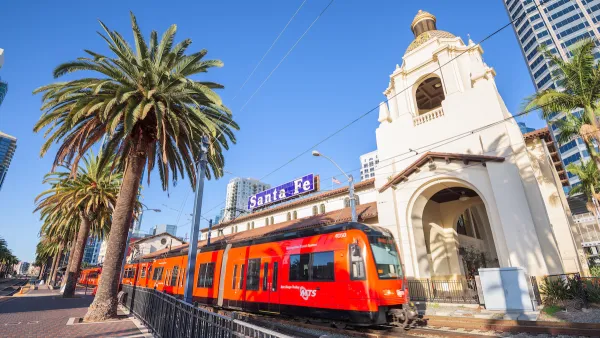In response to conservative opposition to a proposed road user charge, San Diego's regional planning agency is proposing other revenue sources including a tax on ride-hailing and three sales tax increases.

The San Diego Association of Governments (SANDAG) is scaling back its long-term transportation plan due to opposition from conservative leaders who disagree with a proposed road user charge, reports Andrew Keatts.
Opponents claim that the agency doesn't have the legal authority to enforce the charge, putting the programs that would depend on funding from it at risk. According to Colin Parent, Democratic councilman from La Mesa, "unlike a sales tax ballot measure, there’s no legal authority to do it, and unlike a ballot measure there’s no historic precedent for having done it – either locally or elsewhere." Planning for projects funded with a new source of funding that requires new legislation, argues Parent, means the agency is planning work it might never have the revenue for.
Meanwhile, the plan does propose some more traditional funding sources:
- Three sales tax increases to fund transportation improvements.
- Per-ride fees on ride-hailing companies. In addition to bringing in a projected $1.3 billion, the fee is designed to discourage the "emissions-intensive" trips.
- Managed toll and bus lanes on the region's highways, which could bring in over $19 billion. To create the new managed lanes, the agency plans to convert existing lanes as well as expand freeways to build new ones.
FULL STORY: The Other Big Tax Expectations in SANDAG’S New Plan

National Parks Layoffs Will Cause Communities to Lose Billions
Thousands of essential park workers were laid off this week, just before the busy spring break season.

Retro-silient?: America’s First “Eco-burb,” The Woodlands Turns 50
A master-planned community north of Houston offers lessons on green infrastructure and resilient design, but falls short of its founder’s lofty affordability and walkability goals.

Delivering for America Plan Will Downgrade Mail Service in at Least 49.5 Percent of Zip Codes
Republican and Democrat lawmakers criticize the plan for its disproportionate negative impact on rural communities.

Test News Post 1
This is a summary

Test News Headline 46
Test for the image on the front page.

Balancing Bombs and Butterflies: How the National Guard Protects a Rare Species
The National Guard at Fort Indiantown Gap uses GIS technology and land management strategies to balance military training with conservation efforts, ensuring the survival of the rare eastern regal fritillary butterfly.
Urban Design for Planners 1: Software Tools
This six-course series explores essential urban design concepts using open source software and equips planners with the tools they need to participate fully in the urban design process.
Planning for Universal Design
Learn the tools for implementing Universal Design in planning regulations.
EMC Planning Group, Inc.
Planetizen
Planetizen
Mpact (formerly Rail~Volution)
Great Falls Development Authority, Inc.
HUDs Office of Policy Development and Research
NYU Wagner Graduate School of Public Service





























